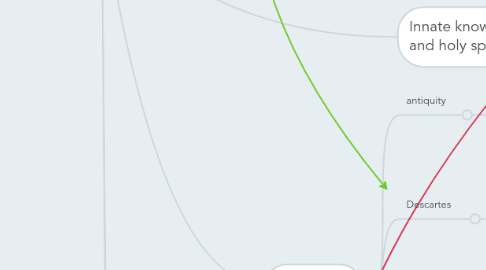
1. Innate knowledge, like the god, and holy spirits
2. Kant
3. sceptics
3.1. Socrates
3.1.1. the only thing we know is that we know nothing
3.2. Descartes
3.2.1. Method of radical doubt
3.2.1.1. Sensory information can not be trusted since it is illusory
3.2.1.2. You cant trust the teachers
3.2.1.3. Cognito ergo sum: I think therefore I am
3.2.1.3.1. The fact that he is doubting cannot be doubted
3.2.1.3.2. Only absolute, certain statements are the basis of knowledge
3.3. Michel de Montaigne
3.3.1. Both reasoning and observation are unreliable
3.3.2. We should not trust the knowledge
3.3.3. the images of reality provided by our senses are illusory
3.4. Peirce
3.4.1. American Pragmatism
4. empiricism
4.1. antiquity
4.1.1. Aristotle
4.1.1.1. knowledge is obtained through senses
4.1.1.1.1. "Nothing is in the intellect which was not first in the senses"
4.1.1.2. no second world exists
4.1.1.3. tabula rasa idea
4.1.1.3.1. We have to learn everything by using our senses.
4.1.1.4. induction
4.1.1.4.1. knowledge through cause (syllogisms)
4.1.1.5. Deduction
4.1.1.5.1. From the universal rule to particular cases.
4.2. Bacon
4.2.1. scientific revolution
4.2.1.1. against aristotelian-medieval worldview
4.2.1.1.1. either bible or aristotele's work answers questions about reality
4.2.2. New Methodology
4.2.2.1. no tabula rasa
4.2.2.1.1. Our mind does not have the perfect image of the world
4.2.2.2. mind perceives images that are distorted
4.2.2.2.1. source of distortion
4.2.2.3. induction???
4.2.2.3.1. critic on aristoteles syllogism
4.3. British empiricists
4.3.1. Locke
4.3.1.1. All of the knowledge come from experience
4.3.1.1.1. = No innate knowledge, white board
4.3.1.1.2. Experience: sensation and reflection
4.3.1.2. Three qualities
4.3.1.2.1. primary quality
4.3.1.2.2. Secondary quality
4.3.1.2.3. Tertiary quality
4.3.1.3. Problems
4.3.1.3.1. Even Locke himself cannot distinguish the three qualities clearly.
4.3.2. Berkeley
4.3.2.1. Idealism
4.3.2.1.1. To be is to be perceived
4.3.3. Hume
4.3.3.1. Everything in our minds is perceptions, perceptions
4.3.3.1.1. Impressions: What you realize what you see
4.3.3.1.2. Ideas: What you remember what you see
4.3.3.2. Copy principle
4.3.3.2.1. All our ideas are simply copies of our impressions
4.3.3.3. A large philosophical idea can be divided into several smaller ideas, then divided into their initial impressions
4.3.3.3.1. No empirical evidence for these ideas
4.3.3.4. Problem
4.3.3.4.1. Missing the shade of blue
4.4. Lakatos
4.4.1. Demarcation criteria
4.4.1.1. falsifiability
4.4.1.1.1. sophisticated falsificationism
4.4.1.1.2. Methodological falsificationism
4.4.1.2. research programs
4.4.1.2.1. core + protective belt
4.4.1.3. progession
4.4.1.3.1. successful predictions
4.4.1.4. accept the progressive research program
4.5. Positivism- Positivist
4.5.1. August Comte
4.5.1.1. Separation between the natural science and social science.
4.5.2. Vienna Circle
4.5.2.1. Demarcation Criterion
4.5.3. Wittgenstein 1
4.6. Constructive empiricism
4.6.1. van Fraassen
4.7. Quine
4.7.1. Naturalism
5. rationalism
5.1. antiquity
5.1.1. Plato
5.1.1.1. cave idea (shadows on the wall)
5.1.1.1.1. we are imprisoned in a cave from the second "true" world and examine shadows on the wall
5.1.1.2. against empiricism: we cant know anything as the truth is in the eye of the beholder
5.1.1.2.1. true knowledge can only be derived from reasoning and ability to think
5.1.1.3. innate ideas exist
5.1.1.3.1. we are born with all knowledge but have forgotten about it. so we dont learn but remember (Anamnesis)
5.2. Descartes
5.2.1. Human reason is the basis of knowledge
5.3. Critical rationalism
5.3.1. Karl Popper
5.3.1.1. Criticizes the induction
5.3.1.1.1. Deduction is the right way
5.3.1.2. Inborn idea
5.3.1.2.1. Biology instincts
5.3.1.3. Falsificationism
5.3.1.3.1. Human is fallible
5.3.1.3.2. Falsifiability
5.3.1.3.3. Only falsifiable theories are informative
5.3.1.3.4. Growth of knowledge via falsification
5.3.1.4. Problems
5.3.1.4.1. Small temporal immunization can be permitted
5.3.1.4.2. Pseudo-science can also make falsifiable statements
5.3.1.4.3. It cannot avoid the inductive inference
